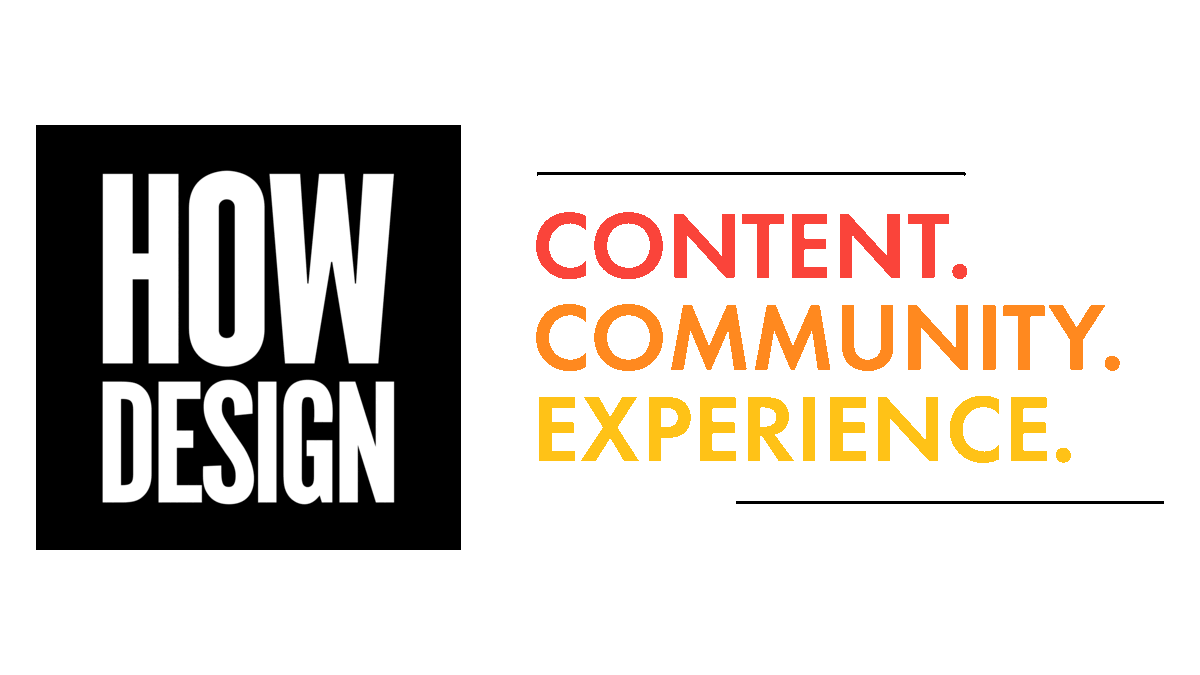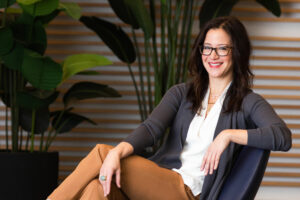 Here’s something that would likely surprise you about the hilarious, candid and seemingly uber-confident Terri Trespicio: She’s an introvert.
Here’s something that would likely surprise you about the hilarious, candid and seemingly uber-confident Terri Trespicio: She’s an introvert.
“100 percent,” she says. “I’d rather be home alone than anywhere. And yet, I discovered that the part of me that yearns to connect flourishes in singular, high-energy events.”
The HOW Design Live mainstage stalwart has worked as a copywriter, magazine editor, teacher, radio host, and all manner of jobs in between—and she has become a master at extrapolating the creative lessons from the sum total of her career.
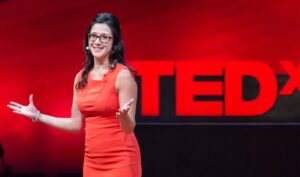 Trespicio’s 2015 TEDx Talk “Stop Searching for Your Passion” has racked up nearly 8 million views, and she recently carried a few of the narrative threads over to her inspiring book Unfollow Your Passion. Next, she will be appearing at HOW Design Live 2023 in Nashville—and at the HOW Women Lead summit, which she is spearheading.
Trespicio’s 2015 TEDx Talk “Stop Searching for Your Passion” has racked up nearly 8 million views, and she recently carried a few of the narrative threads over to her inspiring book Unfollow Your Passion. Next, she will be appearing at HOW Design Live 2023 in Nashville—and at the HOW Women Lead summit, which she is spearheading.
Don’t expect her introvert status to hold her back at either event.
“I’ve discovered that public speaking can be one of the most freeing things you can do,” she says. “It occurred to me years ago that actually no one cares about me up there. They are hungry for what you’re going to tell them about themselves.”
Here, she reflects on passion and personal branding … and even what her beloved Golden Girls can teach us as creatives.
You majored in English at Boston College and then went to Emerson to get your MFA in creative writing. What did you envision doing for your future?
Growing up, I had no idea what I wanted to do. Ever. And more to the point, I was afraid to even say it, I was afraid to even dream it. I think I always felt a little insecure that I didn’t know what I wanted to do. And everything seemed kind of unachievable, which makes no sense—because I was given access to a great education, had supportive family and teachers, had my health. People do a lot more with a lot less.
I loved writing poetry. Having studied and written for so long as a poet really gave me a very fine attention to and clarity around words. I got to be very exact. And today, I think of myself as a kind of corporate poet; I earn my living writing for companies and people, taking what they tell me and turning it into verse, and that’s the same skill. It’s just that rather than taking my experiences, I’m taking someone else’s.
I was invited to join the Honors Program after completing freshman year at Boston College—which is rare. You’re usually put in the honors track upon acceptance. A teacher recommended me that spring. And you know what I did? I turned it down. Why? Because I thought, Well, it’ll probably be too hard for me, I probably couldn’t do it. I’ll probably be too busy to do it. That is one regret I do have. Stupid, stupid, stupid fear. I think that’s why my whole thing right now is to help people minimize that fear because it ruled me.
Professionally, you’ve done a brilliant array of things—copywriting, editorial roles at magazines, radio work, extensive speaking. What’s your best advice for creatives when it comes to career evolution and pursuing new avenues?
For the better part of a decade, I worked at a magazine called Body+Soul that was acquired by Martha Stewart within a few months of my employment. It was formerly New Age magazine, which was talking about the pros of meditation and herbal medicine long before it was cool. And Martha and her design team gave it a makeover, turning the formerly hippie mag into a mainstream publication.
Martha Stewart Living Omnimedia was becoming known as a multimedia company. They had TV shows, books, merchandise, magazines, and even a channel on SiriusXM. And they wanted editors to host and produce those shows. A lot of editors just got pulled into hosting radio shows whether they wanted to do it or not—including me, except I was psyched. I was terrified at first, but I loved it. And I was like, Oh my god, this is the best thing ever. I did it once a week for a while, then the show changed and I filled in for someone doing the daily. And then I inherited it from the last host, and got to do it every day.
What I’ve become good at, and why I’ve been able to do a lot of things in my career, is because I saw where my ability, interest and energy aligned with the business interests of the person who was in the position to bring me on or hire me or assign me to things I wanted to do. I make myself very available and make it clear what I can do, and show up ready. And believe it or not, more times than not people will hand you stuff because you’re there and ready to take it on (and off their plate). So my advice to creatives when it comes to career evolution is you don’t have to quit everything, pull the emergency brake, go back to school, start over. That is what we think, because that’s how we first got to where we are, maybe. But that’s not always how it has to be. Everything you learn is usable in lots of different ways. So many of your skills are transferable. I just took what I was good at and made sure that I found the opportunities, as I said, by seeing what aligned with business interests and opportunity. You don’t just sit and wish, or else you’ll be wishing for a long time.
Your career doesn’t have to feel like rowing upstream—it can feel like you’re catching the current and steering with the tide, drawing on all the tools you have to maintain momentum.
Belated congrats on the publication of Unfollow Your Passion last year! Let’s talk about passion, starting with the title of your book. Can you break it down for us in a nutshell?
Thank you! I will add that the paperback just came out. So yes, let’s talk about passion.…
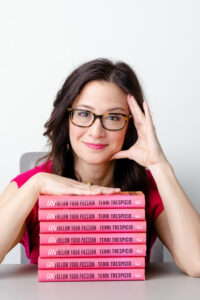 When I say “unfollow your passion”—I love the title, and I can’t lay claim to it! My friend Kim coined that—it doesn’t mean you don’t have passion. It doesn’t mean you don’t care about passion. It’s meant to relieve you of the pressure to know what that passion is; it means not feeling this kind of tunnel vision around it. We think, I need to find the one thing … and yet, that’s no different than being like, “I need to find this one person who will be everything to me and love me and be my magic prince or princess.” Thinking this way takes away our personal power; it says someone or something else has to show up and tell us what to do. So to unfollow your passion is to question conventional and traditional ways of creating a life that you actually want to live, creating work that you want to do. Whether you work for yourself, or someone else—that’s just tax status; it’s not the most important thing. Just because you are a W2 employee and you’re getting a regular paycheck does not mean you can’t think like someone who works for themselves, that you can’t tap your own entrepreneurial and creative genius. The HOW community is full of people who work for other people and also have work they generate on their own, projects they love spending time on and might want to launch. “Unfollowing” means to reinvent the way you pursue and live your life, your career, your choices.
When I say “unfollow your passion”—I love the title, and I can’t lay claim to it! My friend Kim coined that—it doesn’t mean you don’t have passion. It doesn’t mean you don’t care about passion. It’s meant to relieve you of the pressure to know what that passion is; it means not feeling this kind of tunnel vision around it. We think, I need to find the one thing … and yet, that’s no different than being like, “I need to find this one person who will be everything to me and love me and be my magic prince or princess.” Thinking this way takes away our personal power; it says someone or something else has to show up and tell us what to do. So to unfollow your passion is to question conventional and traditional ways of creating a life that you actually want to live, creating work that you want to do. Whether you work for yourself, or someone else—that’s just tax status; it’s not the most important thing. Just because you are a W2 employee and you’re getting a regular paycheck does not mean you can’t think like someone who works for themselves, that you can’t tap your own entrepreneurial and creative genius. The HOW community is full of people who work for other people and also have work they generate on their own, projects they love spending time on and might want to launch. “Unfollowing” means to reinvent the way you pursue and live your life, your career, your choices.
Tell us about some of the common misnomers people have when it comes to passion.
[As I mentioned, there’s a] problem with getting tunnel vision around it. And this is not something I made up. This came from a study that I have cited over and over that was published in Psychological Science. The study found that there are people who have a fixed mindset around passion, meaning they think they were born to do one thing, and one thing only. They believe that once they find it, they will have boundless motivation, things will be easy, and they won’t ever have to work again. This is, of course, not necessarily how things work out.
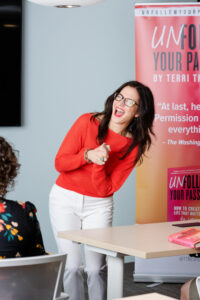 A growth mindset around passion, on the other hand, is the belief that you can continue to grow, learn, and expand on your innate ability and acquire skills throughout the course of your life. What’s interesting is, the people who had a fixed mindset about passion weren’t necessarily more persistent or successful—in fact, they were actually more likely to give up. Because if something became very difficult, they might think, Oh, this must be the wrong passion. Because this is scary and hard. And I don’t know how to do it. Well, if you do that enough, you’re going to be one of these people wandering around saying “I can’t find my passion.” Well, you had a whole bunch and you talked yourself out of them. You gave up too soon.
A growth mindset around passion, on the other hand, is the belief that you can continue to grow, learn, and expand on your innate ability and acquire skills throughout the course of your life. What’s interesting is, the people who had a fixed mindset about passion weren’t necessarily more persistent or successful—in fact, they were actually more likely to give up. Because if something became very difficult, they might think, Oh, this must be the wrong passion. Because this is scary and hard. And I don’t know how to do it. Well, if you do that enough, you’re going to be one of these people wandering around saying “I can’t find my passion.” Well, you had a whole bunch and you talked yourself out of them. You gave up too soon.
You’ve described passion as like a kind of electricity—you can plug it into anything, anywhere. I love that.
I think of passion as a resource we have. Case in point, the example I always use is board games. You don’t have to have a passion for board games to have a lot of fun playing one—and if you look at a group of people engaged in a game, that is what passion can look like: focused, excited, full of energy. This isn’t because of the game necessarily, but because of the energy and attention you bring to this particular fictional gamified circumstance. That’s what’s making that happen. This doesn’t mean you can get excited by anything. But you can find more ways than you believe to tap that ability and experience it more often.
You’re a fantastic speaker, and your sessions continually rank among attendees’ favorites every year. Do you think it’s a skill that can be developed to elevate any designer or creative leader?
I don’t think everyone has to do anything, including be a professional public speaker. But I will say this: There are few things that can catapult you to the center of people’s attention and awareness like standing in front of them and talking. We are a scarce commodity, right? You can’t be in a lot of places at one time. When you are physically there, live or virtual, but in real time—that is very powerful. There’s only one you and you’re the only person with your set of experiences, talents and insights. That alone makes them worth sharing. You don’t have to wait until you’re some kind of phenomenal speaker to do that. If you feel weird about it and say, “Oh, I don’t want to put myself out there and look like I’m all into myself …” realize that’s a false coupling you have in your mind: that to be or pursue public speaking is to be conceited. Again, not true. Often our inner critic tells us those things to talk us out of getting up and speaking, which to the ego is a risky situation.
What I tell people is to think of speaking as a kind of service. It’s you contributing to the communities you want to be part of. It’s an act of giving. You can get paid for it, or maybe not, but you are contributing something of value. And that’s why it’s so meaningful. So I do believe that if you want to be a creative leader, you’re going to have to at some point stand in front of other people and talk. Whether you’re a designer or a writer or marketer, it doesn’t matter. Anyone who has expertise and opinions has something to share. I run a program called “The Speaker Intensive” for people to get their bearings and practice what it is to talk in front of people, and no experience is necessary to participate—because you already have a ton of experience: You’ve been talking your whole life! But I think it’s particularly important for women and people of color to make it a point to be seen and heard, to volunteer to be a model for more people so that our speakers are as diverse as our audiences. As a woman of color myself, I know it’s critical to represent and to encourage others to, as well. We want and need to hear from all different people, period.
While we’re discussing speaking: How can the average designer or nascent leader start to up their presentation game?
Well, it starts with speaking up in a meeting. It starts with starting to say things besides, “Yeah, I agree.” I lead a program called “Unmute Yourself,” designed to give people tools and strategies for ensuring they and others are heard. This isn’t about just talking to hear yourself talk. I’m talking about making sure the mic gets passed. I don’t mean just talk to hear yourself talk. Start by popping in with praise. You can say, “Bob, I’d like to jump in here, because what you just said is so important. And here’s why.” Lend some weight to your voice and add on something of value and point out what other people are doing well. That’s a really warm way to jump in. That’s where it starts, then maybe it goes to the next level where you lead a meeting. You can’t sit there and wait for people to ask you. You do have to suggest, “Hey, I’d love to do this. Would it be helpful? What would be helpful to you? Could I do this for the team (or the client)?”
What is your No. 1 piece of advice when it comes to one’s personal brand?
Here’s my opinion about branding. Don’t worry about how you describe yourself. Focus instead on what the person you want to serve needs. What is their problem? Address their problem first. If someone’s hair is on fire, you don’t go over with a bucket of water and tell them why you like water. You just put out the fire. And then they’ll go, “Who are you?” That’s exactly it. It’s kind of like the superhero thing—a superhero sweeps in and saves you and you’re glad to be saved. And then you’re like, “Who was that woman?” “Who was that man?” People get all tied up in knots trying to figure out, “How do I say that I’m different?” I’m like, talk to them. Talk to them about their problem. It doesn’t have to be so different. It just has to be really clear. I don’t like cute, clever or coy. Have I tended to do some of those things? Yeah, and I don’t like it when I see myself doing it. You’re better off just being really clear about, “Here’s what I see you need, here’s how I can serve that need for you.”
There are lots of creative ways to go about explaining that and saying that. That’s the fun part. And as creatives, that’s the part you’re great at, so I don’t think you need my help.
What is your most essential or critical piece of career advice?
I’m just like anyone else. I get intimidated and overwhelmed and afraid, and I think I can’t do stuff. And I think that my vehement effort to get other people not to be afraid is trying to tell myself that too. We all teach what we most need to learn. And so I’m not someone that’s like, “Get out there, get out of your comfort zone and just try it.” No, I say, “What if you went for it and it doesn’t work out? What are the real stakes?” The stakes are not as high a lot of times as we think they are. So think about what would happen if you tried it.
I think I really wish I realized early on that everyone is afraid—and everyone’s making their best guess.
And finally: You love the Golden Girls. What can they teach us about creativity or design?
 I’m not even being ironic right now: When you really watch that whole series and get to know those women, you see they explore a lot of contemporary and edgy topics. Granted, a lot of it is like, “Whoa, you can’t say that anymore.” But they each take a turn in exploring career, trying something different. Dorothy changes jobs and tries to be a corporate trainer, doesn’t work out because the executives don’t care about learning. She learns the money doesn’t matter; she wants to teach kids. Blanche tries to write a novel and kind of makes herself crazy doing it and thinks she has writer’s block, when she has never written a word. Sophia and Rose start a sandwich company. They all have a turn to try to explore something new. And what they discover is, more often than not, lessons they could not have imagined, in particular, that they can do things they didn’t realize they could. There’s usually a hard lesson around it—Blanche realizes that just because she watches a lot of romantic stuff and reads a lot doesn’t mean that she can write it without practice. And she didn’t want to write, actually; she wanted to be a successful and celebrated author. Two different things. I think they were really wonderful models for trying something new at any age.
I’m not even being ironic right now: When you really watch that whole series and get to know those women, you see they explore a lot of contemporary and edgy topics. Granted, a lot of it is like, “Whoa, you can’t say that anymore.” But they each take a turn in exploring career, trying something different. Dorothy changes jobs and tries to be a corporate trainer, doesn’t work out because the executives don’t care about learning. She learns the money doesn’t matter; she wants to teach kids. Blanche tries to write a novel and kind of makes herself crazy doing it and thinks she has writer’s block, when she has never written a word. Sophia and Rose start a sandwich company. They all have a turn to try to explore something new. And what they discover is, more often than not, lessons they could not have imagined, in particular, that they can do things they didn’t realize they could. There’s usually a hard lesson around it—Blanche realizes that just because she watches a lot of romantic stuff and reads a lot doesn’t mean that she can write it without practice. And she didn’t want to write, actually; she wanted to be a successful and celebrated author. Two different things. I think they were really wonderful models for trying something new at any age.
Get More of Terri Trespicio
For more from Terri Trespicio, check out her website and follow her everywhere on social media: Facebook, Instagram, Twitter or LinkedIn.
